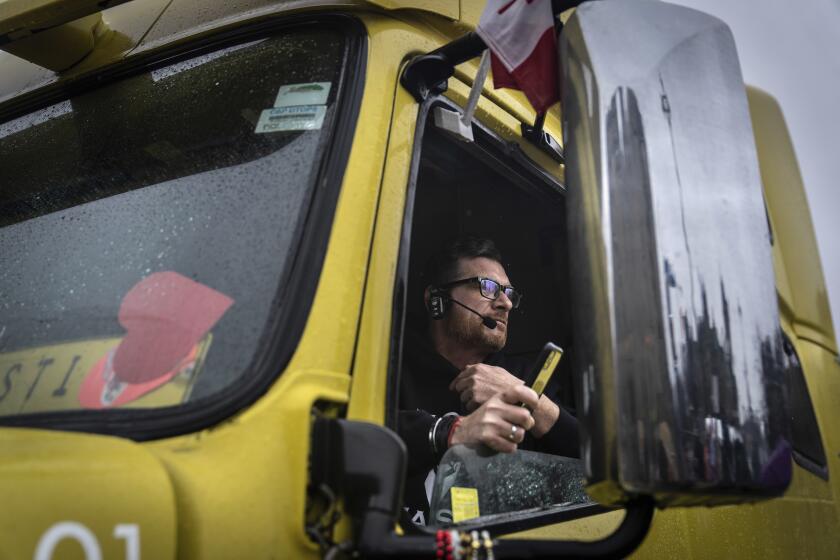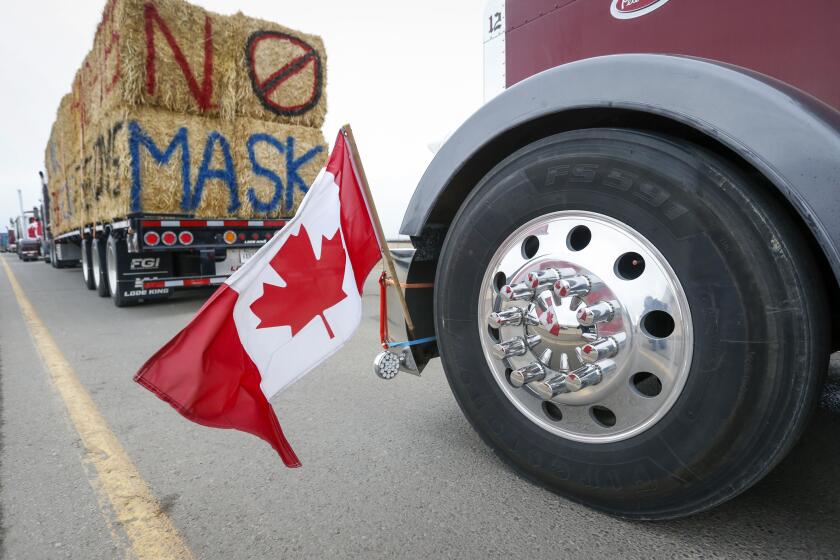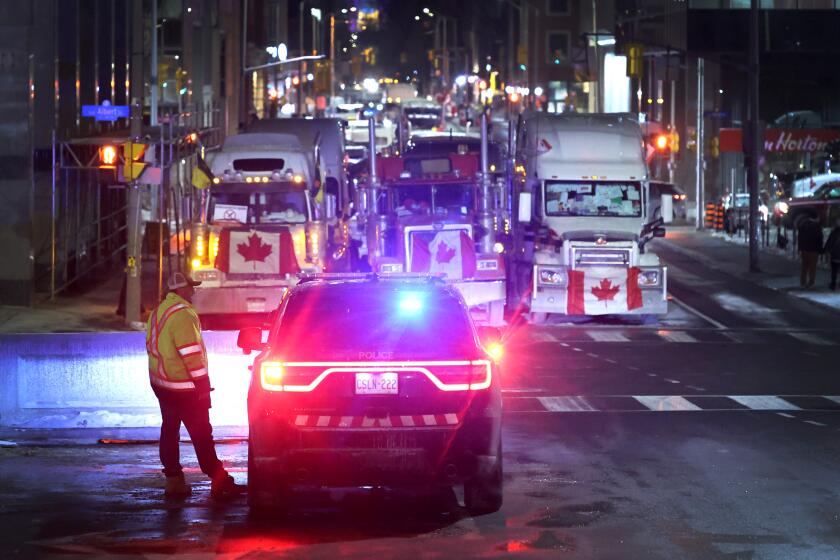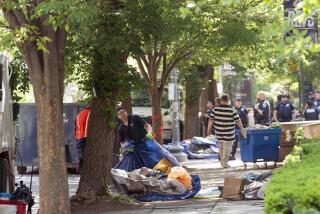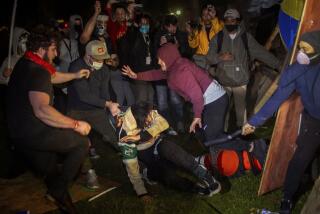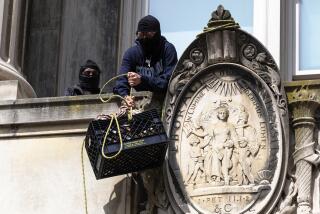Canadian police begin arresting protesters, removing trucks in downtown Ottawa
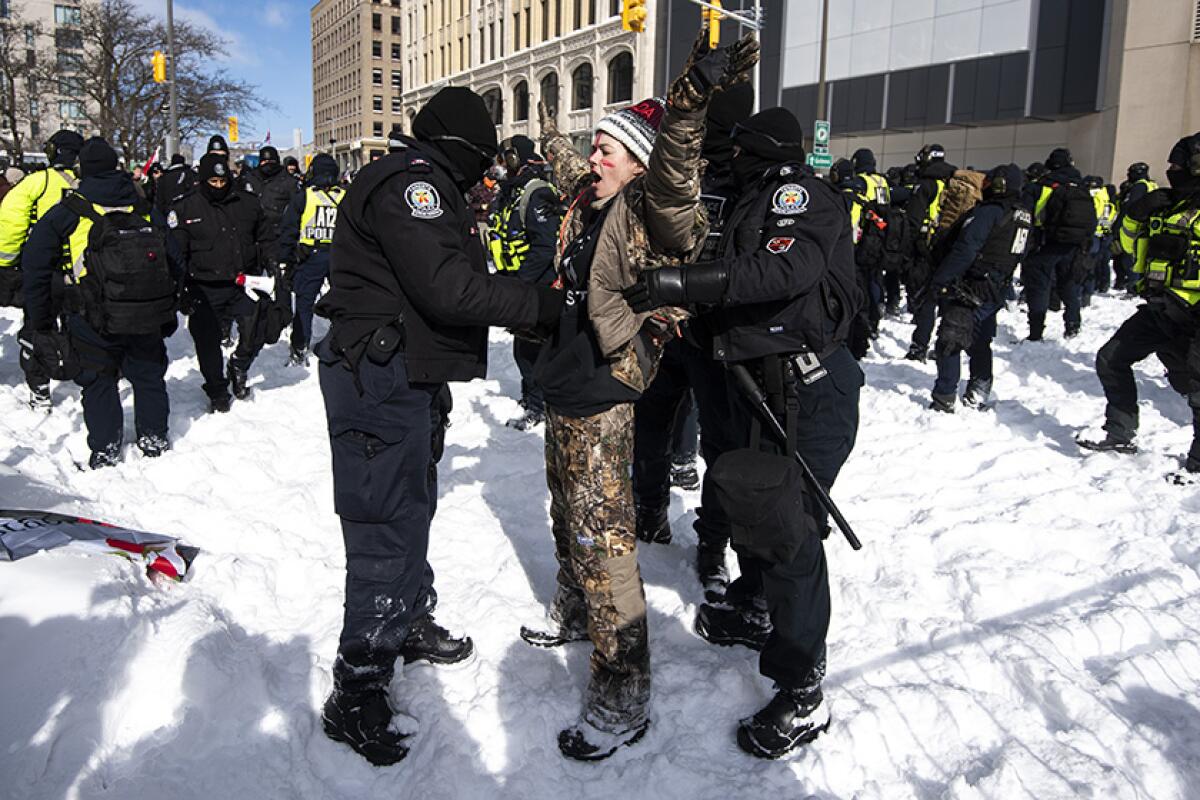
- Share via
OTTAWA — Hundreds of Canadian police officers launched a methodical operation Friday to clear the streets of truckers and other protesters opposed to vaccination mandates who have blockaded the capital for more than three weeks.
The move in Ottawa marked the strongest law enforcement show of force to date against the protesters, who have largely had a free rein since truckers began parking their rigs outside Parliament in protest of COVID-19 mandates and restrictions backed by the Liberal government of Prime Minister Justin Trudeau.
The protests in Canada morphed into a global symbol of resistance to pandemic restrictions, including vaccination mandates, lockdowns and mask-wearing requirements.
By Friday evening, police said they had arrested more than 100 people and towed 21 vehicles. The number of protesters has varied, sometimes from 100-150 or so overnight to 1,500 or more on weekends.
“We will run this operation 24 hours a day until the residents and community have their city back,” Steve Bell, Ottawa’s interim police chief, said during a news conference Friday.
Bell took office this week after his predecessor resigned amid anger with a lack of action against the protesters.
There were no initial reports of major injuries as the long-awaited — albeit slow-motion — crackdown played out under a brilliant sun with temperatures plunging into the teens following an overnight snowfall. However, authorities said late Friday that police faced some aggressive resistance.
“Protesters are assaulting officers, have attempted to remove officer’s weapons,” Ottawa police said in a Twitter message. “All means of de-escalation have been used to move forward in our goal of returning Ottawa to … normalcy.”
Police had not cleared Wellington Street, directly in front of the majestic Parliament buildings, in the heart of the Parliament Hill district. A tense standoff remained as defiant protesters vowed not to leave.
“This has to be brought to a conclusion as quickly as possible and as safely as possible to avoid any loss of life or serious injury,” Ottawa Mayor Jim Watson told Canada’s CTV News station.
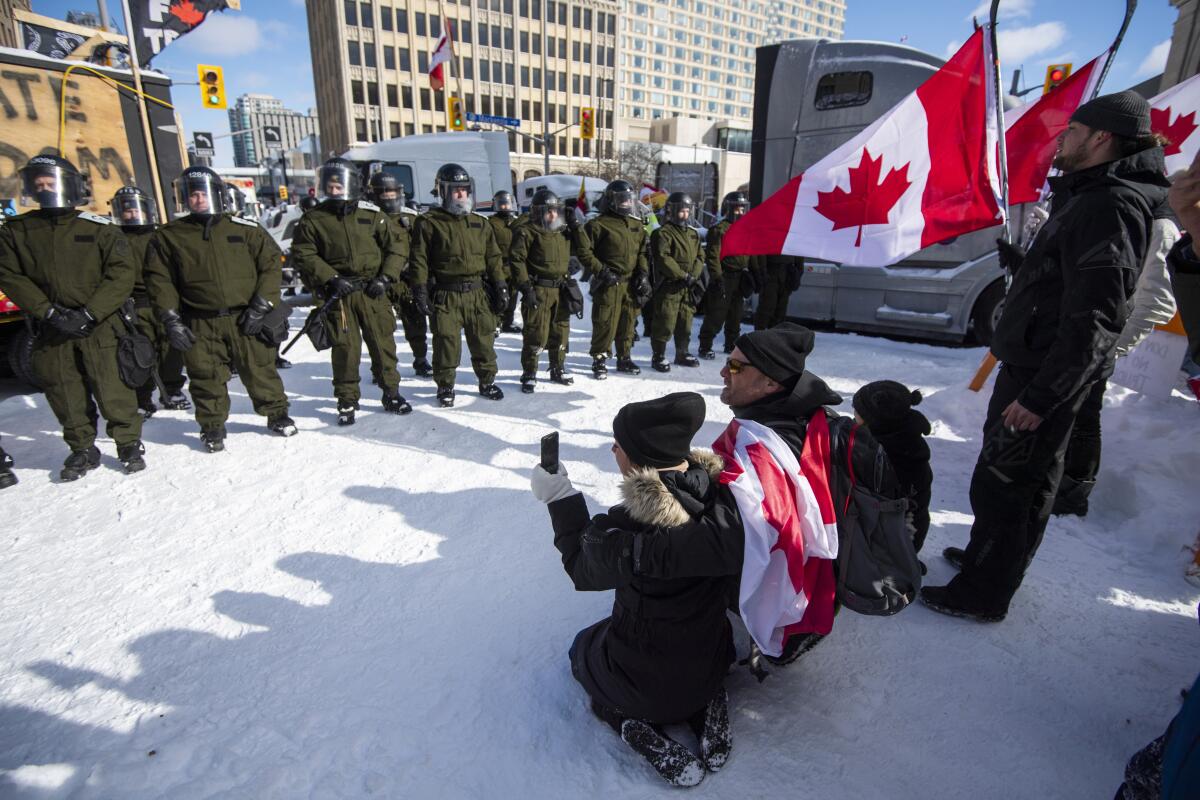
Ottawa police — backed by reinforcements from the federal and provincial governments, as well as from other jurisdictions — also set up about 100 checkpoints near downtown. The roadblocks are meant to deter others from joining the protest and to prevent the ferrying of fuel, food and other supplies to the parked truckers.
Recent weekends have seen raucous celebrations and demonstrations in downtown Ottawa, normally a serene town, celebrations that have enraged politicians and many residents. Monday is a holiday — Family Day— in Ontario, the province where Ottawa is situated, and authorities are keen to avoid another weekend of revelers joining in the street protests.
Many protesters responded to the police action Friday by using shovels to erect snow walls and positioning trucks, campers and other vehicles in the way of officers massed on Wellington Street. Police brought in officers on horseback to create a space between demonstrators and lines of police decked out in helmets and riot gear.
Some protesters linked arms and confronted police with chants of “Freedom!” and “Hold the line!” occasionally breaking into verses of the Canadian national anthem.
The measured initial pace of Friday’s police action — and the reluctance of many protesters to leave — pointed to a gradual operation that could drag on for days. Authorities have estimated that as many as 400 trucks clogged the city center, many positioned side-by-side on Wellington Street, blocking traffic and causing many businesses to close.
The crisis has been a blow to Trudeau’s government and prompted the prime minister this week to invoke never-before-used emergency authorities in an effort to end the protests. Among other things, the emergency law gives authorities the powers to ban public gatherings, declare certain areas off-limits and allow banks to freeze accounts linked to the protesters.
Trudeau has come under withering criticism from opponents for deploying the so-called nuclear option instead of employing the kinds of traditional police and negotiation tactics that were successful in ending similar blockades along the Canadian-U.S. border. However, the border blockades were much smaller in scope than the Ottawa protests.
At midday Friday, speakers on a makeshift stage mounted on a flatbed truck on Wellington Street urged protesters to be prepared to be arrested as police advanced.
“We’re on the right side of history,” Jason McDonald, a protester, told the assembled ranks of demonstrators. “Do what you think is right.”
The protests have featured food and coffee stalls, ad-hoc street hockey games, DJ-curated dance parties and amenities such as play areas for kids and an inflatable hot tub. The scenes of revelry have enraged local lawmakers and residents who say their city has been taken over by out-of-town truckers and troublemakers. Many demonstrators are from rural and western areas, where Trudeau’s Liberal Party has little support.
“My community has been held hostage,” Asir Naqvi, a Liberal member of Parliament representing the downtown area, told a parliamentary hearing Thursday.
A court injunction against horn-honking has not halted the practice, a signature tactic of protesting truckers.
It was still unclear how authorities would manage to move the hundreds of trucks that have been blocking central Ottawa if the drivers do not leave on their own.
Some big rigs that had been stationed on Wellington Street for weeks were seen driving away Friday, honking their horns upon exiting. Police are hopeful that the show of force Friday will convince many more to decamp and avoid a violent denouement on Parliament Hill.
Some conservatives in the United States have voiced support for the trucker protests, and some have donated to the “Freedom Convoy” movement. But organizers say the protest is an overwhelmingly Canadian operation.
Prominent American conservatives who embrace the Canadian truckers protesting COVID-19 restrictions are drawing new accusations of hypocrisy.
The chaos in Canada’s capital and beyond isn’t just about anti-vax protests. It’s a melting pot for a variety of grievances and antisocial beliefs.
Canada deals with images of truckers and others protesting against COVID-19 mandates and leveling other grievances, sometimes with vulgarity and incivility.
Breaking News
Get breaking news, investigations, analysis and more signature journalism from the Los Angeles Times in your inbox.
You may occasionally receive promotional content from the Los Angeles Times.
More to Read
Sign up for Essential California
The most important California stories and recommendations in your inbox every morning.
You may occasionally receive promotional content from the Los Angeles Times.
